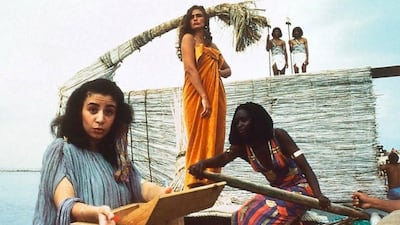Egyptian cinema underwent a transitional period in the 1990s.
A new generation of directors, writers and actors was drawn to creating more innovative, serious pieces of work. In particular, there was more use of comedy as a tool, not only to entertain, but also to observe and critique society in more nuanced ways.
It was a time when creatives explored social issues (particularly those facing the Egyptian middle classes) through stories that led to the country's state during the 1990s. These pull from both historical incidents and contemporary issues.
From dark comedies to biographies, here are The National’s picks for the eight films you should watch from the 1990s.
Supermarket, 1990
Directed by one of Egypt’s most celebrated directors, the late Mohamed Khan, Supermarket has been hailed for its exploration of the social and economic changes the country faced as it entered a new decade.
The story follows Ramzi, a principled musician who works as a pianist at a luxury hotel. The film delves into Ramzi's troubled marriage and issues with his in-laws. The film is a nuanced portrait of Egyptian society at a time of great change. It shows how art, culture and social class were transforming in the light of growing capitalist pursuits.
Iskandria Kaman wa Kaman (Alexandria Again and Forever), 1990
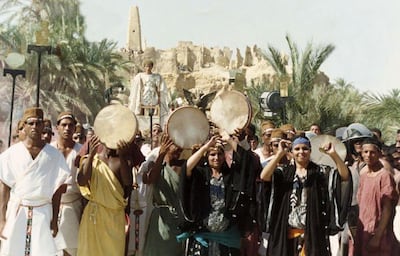
The third instalment of renowned director Youssef Chahine's Alexandria Trilogy, the film is a blend of genres and an exploration of identity.
Based on Chahine’s own life, the story explores the experiences of ageing film director Yehia Eskandarany, played by Chahine himself, as he looks back at his career after a violent argument with his favourite actor and friend, Amr.
Yehia’s whole life, his love for his country and for cinema in particular, shifts as he tries to understand the root of the breakdown with his long-time collaborator through the lens of his career.
The film is a feat in storytelling, where the non-linear narrative combines elements of romance, comedy, political drama, bold musical numbers and dances that act as an extension of Yehia's emotional state and aspirations.
Kit Kat, 1991
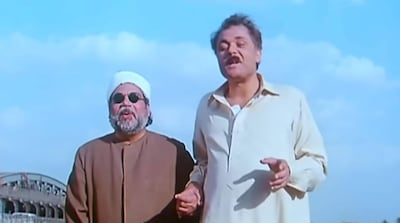
The comedy-drama follows Sheikh Hosni, a blind man living in the Al-Kit Kat neighbourhood in the slums of Giza, Egypt.
Played by the renowned actor Mahmoud Abdel Aziz, Sheikh lives with his elderly mother and frustrated son Youssef who dreams of moving to Europe.
Despite Sheikh’s blindness, he refuses to accept his disability as a limitation to his dreams of riding a motorcycle. In order to cope with his less than desirable financial circumstances and his strained relationship with his son, Sheikh spends his time using drugs and learning the affairs and secrets of the people in his neighbourhood.
The film is notable for its portrayal of the everyday struggles faced by inhabitants of the slums in Egypt.
Shahateen wa Noubalaa (Beggars and Noblemen), 1991
Based on the novel Proud Beggars by the Egyptian-French writer Albert Cossery, the film is set in Cairo during the final days of the Second World War.
It follows the story of two men who are intricately connected to one another. Gohar, a former university professor, has killed a young prostitute in an empty brothel. Nour El-Din is the police inspector who has been assigned to investigate the murder.
In his pursuit of Gohar, the story unfolds the lives and struggles of both men while depicting a powerful portrayal of Egyptian society during a significant historical period that dramatically changed the country’s future.
Al-irhab wal Kabab (Terrorism and the Kebab), 1992
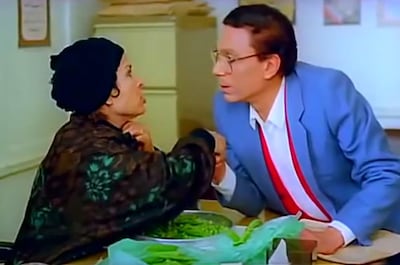
Starring the Arab world’s most celebrated actors and comedians such as Adel Emam, this film is a satirical take on bureaucracy and social issues in Egypt that felt relevant across the region.
The story revolves around Ahmed, a frustrated family man, played by Emam, visiting the Mogamma, a large and complex government building in Cairo, in order to obtain a school transfer for his children.
However, after days of unsuccessful attempts to navigate the overly complicated bureaucratic process, Ahmed unwittingly becomes entangled in a series of events and finds himself in control of the whole building and organisation. The film uses humour to critic inefficiency and corruption.
Harb al Farawla (Strawberry War) 1994
The dark comedy explores themes of happiness and wealth through the lives of three characters who become entangled in an affair.
Thabet, played by the Sami El Adl, is a wealthy businessman who becomes depressed after losing his only son and is trying to make sense of his life. He then meets Hamama, played by Mahmoud Hemeida, a poor fruit seller engaged to Farawla, played by the renowned actress Yousra, a flower-selling widow with a young son
When Thabet’s lawyer offers the couple money and a home to “cure” his client of depression the three spend more time together and Thabet finds himself intrigued by Farawla, enraging Hamama along the way.
Known for its unusual story, fantastical story elements and its dark sense of humour, the film has been acclaimed for its unique approach to important societal issues.
Nasser 56, 1996
Starring the late legendary actor Ahmed Zaki in one of his most well known roles, this is a historical film that focuses on a pivotal moment in Egyptian history that greatly affected the Arab region – and the world.
The nationalisation of the Suez Canal is one of the most notable and dangerous periods during former Egyptian President Gamal Abdel Nasser's (played by Zaki) time in office. The story is told from an Egyptian and nationalist point of view, exploring Nasser’s relationship with the Revolutionary Command Council, ministers, his office, as well as his wife, children, and father during this time.
Arak al-Balah (Date Wine), 1998
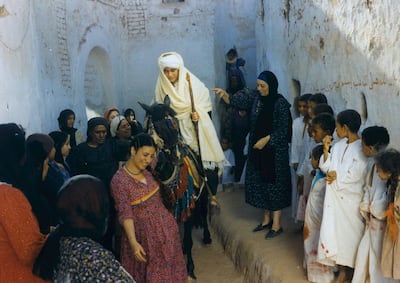
Set in a remote upper Egyptian village, cut off from the rest of the world, a mysterious stranger arrives and lures men away with promises of wealth and opportunity in far away lands. Only two men remain behind – an elderly, disabled grandfather and his grandson, Ahmed, whose ambition is to climb the tallest palm tree in the village.
When some of the men eventually return from their trip, they are different – bitter and hardened by the outside world and resentful of Ahmed’s cherished position in the village.
The film explores themes that were becoming more prevalent in the zeitgeist of the time, such as migration, tradition, and masculinity.
